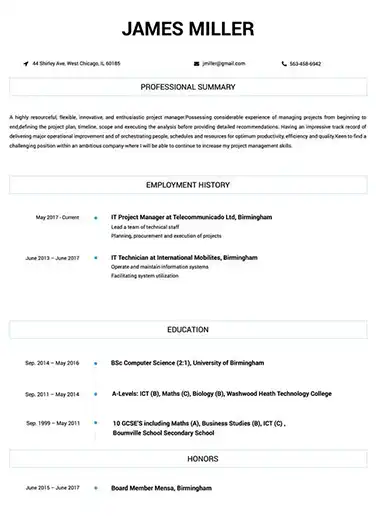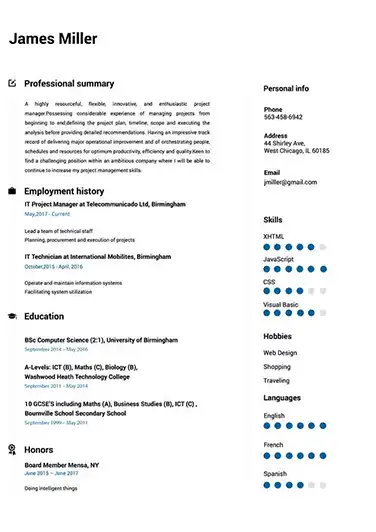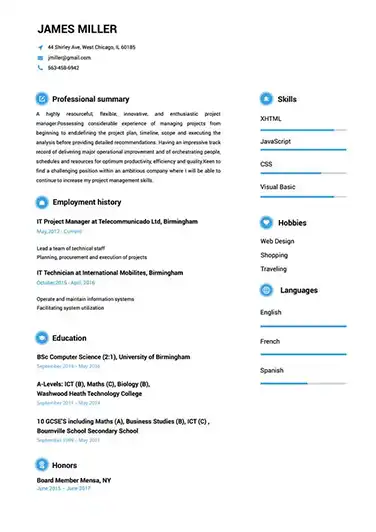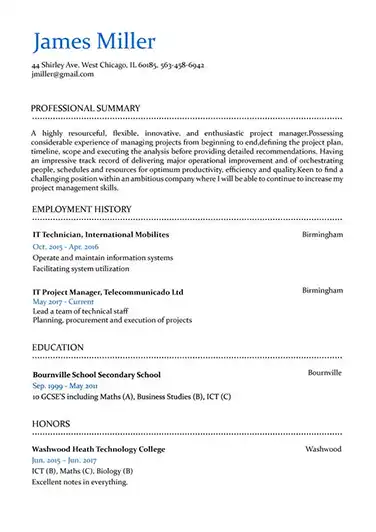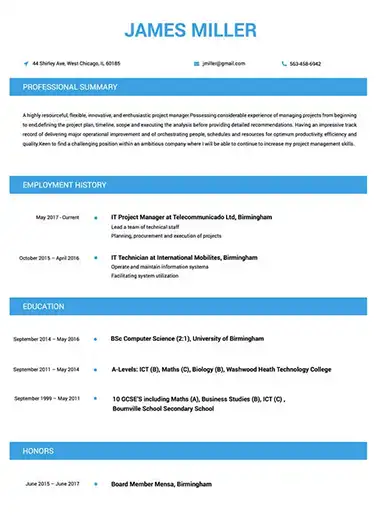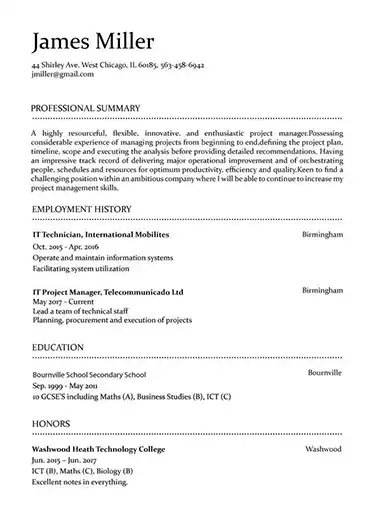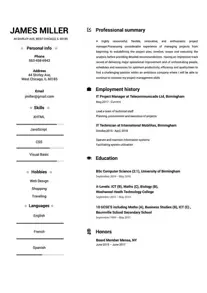 Use This Template
Use This Template
Build your resume in 15 minutes
Create an awesome resume that meets the expectations of potential employers with our selection of professional, field-tested resume templates.
nurse: Resume Samples & Writing Guide
ianthompson23@icloud.com
811-766-4933
Professional Summary
Employment history
- Document patient care services by charting in patient and department records
- Maintain a clean and safe environment for patients
- Provide patient and family education regarding illness, care needs and self-care
- Administer and monitor patient medications
- Provide patient and family education regarding illness, care needs and self-care
- Perform diagnostic tests and analyze results
- Provide patient and family education regarding illness, care needs and self-care
- Document patient care services by charting in patient and department records
- Administer medications and treatments as prescribed by a physician or authorized prescriber
Education
Skills
Do you already have a resume? Use our PDF converter and edit your resume.
adams-danny@icloud.com
705-152-1620
Employment history
- Perform diagnostic tests and analyze results
- Monitor, record and report symptoms and changes in patient's condition
- Operate and monitor medical equipment and instrumentation
- Provide emotional support and comfort to patients and their families
- Consult and collaborate with other health care professionals to plan, implement, coordinate and evaluate patient care plans
- Administer medications and treatments as prescribed by a physician or authorized prescriber
- Coordinate and facilitate patient care throughout the health care team
- Administer and monitor patient medications
- Maintain a clean and safe environment for patients
Education
Skills
longwalt16@outlook.com
898-090-4479
Employment history
- Administer medications and treatments as prescribed by a physician or authorized prescriber
- Monitor and report changes in patient symptoms and/or condition to physicians
- Assess patient health problems and needs, develop and implement nursing care plans, and maintain medical records
- Administer medications and treatments as prescribed by a physician or authorized prescriber
- Provide emotional support and comfort to patients and their families
- Administer and monitor patient medications
- Participate in research and clinical trials
- Administer and monitor patient medications
- Administer medications and treatments as prescribed by a physician or authorized prescriber
Education
Skills
samanderson@protonmail.com
872-023-6702
Professional Summary
Employment history
- Assess patient health problems and needs, develop and implement nursing care plans, and maintain medical records
- Operate and monitor medical equipment and instrumentation
- Administer medications and treatments as prescribed by a physician or authorized prescriber
- Provide emotional support and comfort to patients and their families
- Perform diagnostic tests and analyze results
- Provide patient and family education regarding illness, care needs and self-care
- Document patient care services by charting in patient and department records
- Participate in research and clinical trials
- Monitor, record and report symptoms and changes in patient's condition
Education
Skills
quinnjack@icloud.com
620-123-1774
Professional Summary
Employment history
- Administer medications and treatments as prescribed by a physician or authorized prescriber
- Participate in research and clinical trials
- Operate and monitor medical equipment and instrumentation
- Assess patient health problems and needs, develop and implement nursing care plans, and maintain medical records
- Monitor, record and report symptoms and changes in patient's condition
- Educate patients and their families on health maintenance, disease prevention, and strategies to promote health
- Monitor, record and report symptoms and changes in patient's condition
- Assess patient health problems and needs, develop and implement nursing care plans, and maintain medical records
- Perform diagnostic tests and analyze results
Education
Skills
Not in love with this template? Browse our full library of resume templates
As a registered nurse you will be well aware of the fact that nursing is one of the most rewarding but challenging professions out there. Nurses require a high level of training, subject matter knowledge, and technical skills to provide the best quality care possible to their patients. They also need to demonstrate “soft skills” like empathy and strong communication skills.
Unfortunately, showing your competency in a healthcare setting is an entirely different matter to showing it on your resume. If your resume doesn’t convince a hiring manager that your experiences, skills, and education make you the right person for the job, you will have a hard time securing a job in this profession.
Even if you are the best person for the job, you won’t get a look in if your resume is poorly put together. That’s why it’s vital that your nursing resume is written and formatted in a way that clearly communicates why you are miles ahead of your competition.
If you’re struggling to create a resume that does all of this, our guide below will provide you with the step-by-step instructions and insider tips you need to make your nursing resume stand out.
Our nursing resume guide will clearly explain:
- How to optimally format your resume
- What details need to be included
- How to make your nursing resume eye-catching to hiring manager
- Which resume templates you can use to efficiently make a professional resume
If you’re a registered nurse who’s ready to start getting more job offers, here’s our guide to everything you need to do:
1. Multiple Template Examples
2. How to Write a Perfect Nursing Resume
How to format your nursing resume
The way you format your nursing resume can make a dramatic difference to how a hiring manager views your application. If the most important information in your resume is not immediately apparent, they may simply dismiss your application altogether.
That’s why it is essential to format it in a way that puts a spotlight on two sections in particular:
- Your experience
- Your education
The resume format that does this best is the reverse-chronological format. In this format, your work experiences are organized into reverse-chronological order. That is, your most recent work experience is presented to the reader first, followed by your second most recent work experience, and so forth.
Your education is also featured prominently in this resume format, which is ideal considering that it is compulsory to have the right training in this profession.
In terms of the optimal layout of your resume, we recommend the following general guidelines:
- Number of Pages: 1 page maximum.
- Fonts to Use: Easy-to-read, classic fonts such as Times New Roman and Arial.
- Fonts to Avoid: Difficult-to-read or “fun” fonts such as Pinyon Script and Comic Sans.
- Margins: 1 inch on all sides.
- Line Spacing: 1 or 1.15.
- Header size: 14-16 point size.
- Text size: 11-12 point size.
What recruiters are looking for
In order to create a strong nursing resume, you need to understand what recruiters are looking for. Generally speaking, recruiters give preference to nursing resumes that offer a good balance of education, experience, and skills that match the position at hand. The ideal candidate is someone who is not only professionally competent, but also has a passion for nursing.
The key word here is “balance.” For example, a candidate who went to a great school but does not convincingly demonstrate in their resume that they possess relevant skills will not go very far in the hiring process. To make each section of your resume count, you must spend time refining each section of it.
How you present your resume is an equally important factor to recruiters. Despite having a solid educational background, relevant experience and sought-after skills, many candidates’ resumes aren’t given a second look because they are not logically organized or they look haphazardly put together.
In short, recruiters are looking for a well-organized, professional-looking resume that communicates why the candidate’s education, experience and skills will make them an excellent hire.
What skills to mention and how to do it correctly
Any nurse will tell you that nursing isn’t just about applying your technical skills. You also need to know how to use soft skills so that you can genuinely connect with patients, maintain organization, and work efficiently.
Nursing thus involves two different—albeit equally important—types of skills: technical/hard skills and soft skills. It is therefore critical that you mention both types in your nursing resume. Below we have highlighted the two types of skills to include along with some helpful examples of each:
- Technical/hard skills: blood administration, pain management, wound irrigation, and surgery preparation.
- Soft skills: teamwork, critical thinking, empathy, and attention to detail.
Including both hard and soft skills in your resume will highlight what a well-rounded and highly-skilled candidate you are. Considering that many candidates only choose to focus on one type of skill set to the detriment of the other type will also help your resume truly pop.
We recommend that you include your skills in a dedicated skills section. This will assist the hiring manager to easily identify what skills you offer. You should also “pepper” these skills throughout your job description bullet points as you see fit.
The best approach to take when selecting which skills to feature is to first pinpoint which ones the hiring manager is looking for. This step couldn’t be easier considering that many job descriptions readily include this information! Next, take the time to work out how these skills match your specific skill set and determine which ones are the most appropriate to include in your resume.
Once you’ve done this, you can use your best judgment to add any other skills that you believe would be applicable and sought-after in the job you are applying for.
Pro tip: It’s a good idea to also take a look at the website of the facility to get a better idea of their values and the skills they are looking for.
What achievements to mention and how to do it correctly
Needless to say, you will now have a number of nursing achievements that you would like to feature in your resume. As it is not possible to include them all, how do you know which ones deserve to make the cut?
You should mention achievements that are:
- Relevant to the job you are applying to
- Eye-catching
- Measurable (where possible)
Like we suggested in the skills section above, it’s a good idea to take a look at the job description as well as the facility’s website. They may be able to provide some guidance about what achievements would impress the hiring manager.
Once you have worked out which achievements to include, you need to work on your delivery of them. Simply stating what you’ve done is only part of the story. You should also put a spotlight on how and why your achievements have made a positive impact in your workplace.
For example, this statement only highlights the “what”:
- Make changes to patient treatment plans.
Whereas, this statement highlights the “what” in addition to the “how” and the “why”:
- Modify patient treatment plans as indicated by patients' responses and medical charts to provide more personalized care.
Needless to say, the latter statement sells the nurse’s achievement far more convincingly than the former one. Unlike the former statement that only describes what the nurse did, the latter statement highlights how they did it, as well as the result/reasoning behind their actions.
This clearly conveys to the hiring manager that the nurse not only has the expert knowledge and skills to take such a course of action, but also has the care to do so. In just one sentence, the nurse is able to successfully demonstrate their deep understanding of professional practices and possession of important soft skills.
Pro tip: When in doubt, ask yourself if the bullet point highlights the impact of each course of action by explaining the “what” as well as the “how” and/or “why.”
Should you include information about your nursing license? If so, how should you do it?
It is strongly recommended that you include your nursing license type and number on your resume. Not only will including this information leave no question as to your qualifications to practice nursing, it will also so will save the hiring manager from looking it up themselves on a database.
So how should you list your license details?
The American Nurses Credentialing Center (ANCC) recommends listing your license details after your education section.
Under the heading “License/s” include the following information, as appropriate:
- License name
- Certifying body
- State of licensure
- Expiration date (in cases where there is no expiration date, state the date acquired)
- License number
For example:
Kelly McAdams, Registered Nurse, Alaska Board of Nursing, AK, Expires: Jan, 2022, # 71628392
Pro tip: Remember, a resume that readily includes everything a hiring manager is looking for is far more likely to impress! If you are concerned for your privacy, it is worth keeping in mind that licenses can be looked up on the public record anyway.
How to write a resume objective (with examples)
If you only have limited nursing experience, you may be wondering how to structure a resume to your advantage. One insider tip for student nurses, new graduates or anyone else with only a few years or less of nursing experience is to include a resume objective rather than a resume summary at the top of your resume.
A resume objective provides you with the opportunity to communicate what you’re looking for from a role, while briefly mentioning your professional experiences. Conversely, a resume summary provides an overview of your work history. If your nursing experience is limited, it is far more advantageous to start off your resume by focusing on your professional motivations and goals instead of your minimal nursing experience.
The key to writing a strong resume objective is to concisely convey what you are looking for professionally. Keep your resume objective to 2-4 sentences maximum. Consider the following examples:
- Student nurse with a 3.6 GPA in his final year of studies. Seeking an internship in the pediatric ward of a hospital with the goal of becoming a pediatric nurse.
- Registered nurse with 6 months of healthcare experience seeking a position in a fast-paced healthcare setting. Looking for an opportunity to apply the nursing skills developed when interning at one of the state’s largest hospitals.
How to write a resume summary (with examples)
If you have more than a few years of nursing experience under your belt, it is in your best interests to include a resume summary at the top of your resume.
The key to writing a strong resume summary is to provide a short but insightful overview of your most notable professional experiences. If you have space, you can also include any other relevant attributes or achievements that make you stand out. Consider the following examples:
- Registered nurse with 5 years of experience specializing in palliative care. Currently working in a 28-bed palliative care unit with responsibilities including administering medication, maintaining patients’ physical, mental and emotional health, and communicating with patients’ loved ones. Fluent in Spanish and Chinese.
- RN with over a decade of experience in a range of healthcare settings including community hospitals, outpatient clinics, and nursing homes. Commended for a patient-first approach to healthcare and continued professional learning. Member of the American Nurses Association (ANA).
Pro tip: Try to keep your resume summary to 2-4 sentences maximum.
Additional sections you can include in a resume
There are a handful of additional resume sections you can include to make your application more memorable to hiring managers. While these sections are not mandatory to include, it is recommended that you add one or more of these sections to the end of your resume where possible. Keep these sections tight and only include information you are willing to discuss at the interview stage.
- Any nursing-related awards you have received: Are you an award-winning nurse? Don’t be shy about highlighting any awards you’ve received either during your schooling or career.
- Any foreign languages you speak: Given the diversity of patients that are admitted to healthcare settings, there is an increasing demand for nurses who are multilingual.
- Conferences or courses you have attended: Professional learning in the form of conferences or courses you have attended is looked upon favorably by hiring managers. They demonstrate your enthusiasm for the profession as well as your willingness to continually develop your knowledge and skills.
- Professional affiliations: It is worthwhile noting if you are part of any nursing associations. For example, the American Nurses Association (ANA), the National League for Nursing (NLN), American Health Care Association or any other professional associations related to nursing.iation
Providing information about healthcare institutions you've worked for and why it's important
Most healthcare institutions are looking to hire nurses whose past experience and skill set is similar, or at least transferable, to the role at hand. For instance, most will give preference to nurses who have worked in similar-sized medical institutions or similar-sized units.
They will also look for nurses whose current or past duties match those of the job description. After all, while basic nursing duties may be similar across a range of healthcare settings, there is a marked difference between the specific duties that different types of nurses perform.
This is why we advise including details about each medical institution you have worked for. Providing this information will assist the hiring manager to assess your suitability to the job and will also allow you to apply for more fitting jobs.
We recommend including the following information about each medical institution:
- The exact duties you performed
- The units you worked in
- What each institution does
- Their size (e.g. number of beds, number of patients you were responsible for)
What additional information is necessary for a nursing resume
If you still have space on your resume, you may also include information about any nursing or healthcare-related volunteering positions you have undertaken. Volunteering shows your interest in supporting the community and your genuine passion for nursing. It could be just the thing that puts you ahead!
3. How to Make Your Resume Stand Out
According to the Bureau of Labor Statistics (BLS), employment of registered nurses is projected to grow 12% from 2018 to 2028. With such solid employment prospects, you may be wondering why it’s so vital to make your nursing resume stand out from the resumes of other candidates.
Simply put, by creating a resume that stands out, you will be able to give yourself the best chance of getting the nursing job you’ve always wanted. After all, you won’t be the only one applying for a coveted position. While employment for nurses is on the rise, the National Center for Biotechnology Information (NCBI) notes that there are 3.9 million nurses and midwives in the United States alone.
There’s a world of difference between nursing jobs in different healthcare settings. If you want to ensure you find a job that you are passionate about which also boasts great pay and conditions - make your resume stand out in the following ways:
Avoid generalizations
A surefire way to quickly lose a hiring manager’s attention is to use generalizations. A hiring manager wants to learn about your specific job experience—not read some vague explanation of what nurses do in general!
A good way to personalize your experience is to put a spotlight on any tangible improvements you made using relevant numbers and percentages. For example:
This statement is too vague and unconvincing:
- Made big changes to the rotational system in my unit to improve staff efficiency.
Meanwhile, this statement is specific and immediately impresses the reader:
- Overhauled the rotational system that resulted in a 210% improvement in staff efficiency.
Use powerful action verbs
Another way to differentiate your resume is to use powerful action verbs. Each job description bullet point should start with a verb. But not all verbs are created equal! There are the standard verbs (e.g. helped, provided, etc), and then there are verbs that are inherently eye-catching and impactful.
Here are some action verbs to consider including in your nursing resume:
- Record
- Explain
- Report
- Screen
- Analyze
- Consult
- Monitor
- Observe
- Advise
Compare the following examples and note the significant difference an action verb can make to a resume. (Hint: Compare “wrote” vs. “compiled” and “gave” vs. “delivered”)
- Wrote reports about patients and gave them to the doctor in charge.
vs.
- Compiled patient reports based on patient observation and analysis of their charts, then delivered them to the doctor in charge.
Pro tip: Don’t forget to also state the “how” and “why” as well!
4. How to Use a ResumeBuild Template to Make a Nursing Resume
As you’ve now discovered from reading our guide above, there are a number of considerations you need to keep in mind to create a professional-looking nursing resume. It isn’t simply a matter of typing out your education history, work experience, skills, and other relevant information. You need to communicate everything in a clear and concise manner that allows your achievements to shine.
If you’re struggling to follow all of our expert tips above - you’re not alone. Many nurses find the process of putting together their resume incredibly challenging. Others may simply not have the time to work on perfecting their resume.
So why not make use of a professionally-made resume template? At ResumeBuild, we specialize in designing HR-friendly resume templates for job seekers. The process of creating a nursing resume with one of our ResumeBuild Templates couldn’t be simpler.
Our online resume builder streamlines the process of making a nursing resume by providing you with access to our vast template library. For example, our Classic resume template would be perfect for your nursing resume. The clean, fuss-free appearance is precisely what hiring managers of nurses are looking for.
Remember, to highlight your professionalism as a nurse you need a resume that is equally professional-looking. It is therefore advisable to avoid any “fun” resume template designs and instead select one that has a polished and minimalist design.
Ready to start creating your nursing resume using the Classic template—or any of our other resume templates? After you’ve selected your preferred template, just complete the following 5 straightforward steps:
- Fill out your Personal Info Section: Provide personal information such as your name, address, and contact details.
- Fill out your Experience Section: First, select “Nursing” from the “Career field” subheading. You can then select the appropriate “Career subfield.” Now, you can freely make use of our pre-written nursing job description examples or write your own.
- Fill out your Education Section: Add information about your educational background such as your school name, school location, degree, field of study, and graduation date.
- Fill out your Skills Section: Note down 6-8 of your top skills. You can choose to add a skill level for each or leave this off.
- Complete your Summary Section: Select “Nursing” from the “Career field” subheading to access nurse-specific summary section examples.
Once you’re done piecing together your nursing resume with our resume builder, make sure to review it. Of course, you can always come back to it and edit it anytime by accessing your ResumeBuild account.
Key Takeaways
Making a nursing resume that hiring managers love is anything but impossible. There are plenty of steps you can take to make a positive impression on hiring managers, from conveying your achievements in the right way to using action words. You can choose to either spend the time and effort putting together your resume using our guide above, or simply use a reliable resume builder to do most of the hard work for you.
When you’re ready to start working on your nursing resume, be sure to keep our insider tips in mind. With a few tweaks here and there (or a complete overhaul of your resume!), you’ll be able to finally score the nursing job you’ve always dreamed of.
nurse Job Descriptions; Explained
If you're applying for an nurse position, it's important to tailor your resume to the specific job requirements in order to differentiate yourself from other candidates. Including accurate and relevant information that directly aligns with the job description can greatly increase your chances of securing an interview with potential employers.
When crafting your resume, be sure to use action verbs and a clear, concise format to highlight your relevant skills and experience. Remember, the job description is your first opportunity to make an impression on recruiters, so pay close attention to the details and make sure you're presenting yourself in the best possible light.
nurse
- Maintain accurate, detailed reports and records.
- Monitor, record and report symptoms and changes in patients’ conditions.
- Record patients’ medical information and vital signs.
- Modify patient treatment plans as indicated by patients’ responses and conditions.
- Consult and coordinate with health care team members to assess, plan, implement and evaluate patient care plans.
- Order, interpret, and evaluate diagnostic tests to identify and assess patient’s condition.
- Monitor all aspects of patient care, including diet and physical activity.
nurse
- Assess patients’ general physical appearance to make diagnoses.
- Examine patient to obtain information on medical condition and surgical risk. Communicate with Physician or Nurse Practitioner regarding physical assessment and provide physical findings and accurate documentation including detailed patient history as reviewed prior to exam.
- Review a individualized plan of care for each patient to promote optimum health and review any tests or procedures for medical necessiy.
- Maintain EMR and privacy acts according to HIPPA standards.
nurse
- Direct and supervise less skilled nursing/health care personnel, or supervise a particular unit on one shift
- Prepare patients for, and assist with, examinations and treatments.
- Instruct individuals, families and other groups on topics such as health education, disease prevention and childbirth, and develop health improvement programs.
- Prepare rooms, sterile instruments, equipment and supplies, and ensure that stock of supplies is maintained.
nurse
- Inform physician of patient’s condition during anesthesia.
- Deliver infants and provide prenatal and postpartum care and treatment under obstetrician’s supervision.
- Administer local, inhalation, intravenous, and other anesthetics.
- Provide health care, first aid, immunizations and assistance in convalescence and rehabilitation in locations such as schools, hospitals, and industry.
nurse
- Administers medication, intravenous therapy and other aspects of nursing care
- Served as a liaison between patient and doctor.
- Make judgments on patient conditions and called doctors based on those decisions.
- Educate patient and family on procedures and disease processes.
- Developed through on patient care plans.
- Prepared the patient for anesthesia and surgery
- Practiced aseptic technique by preparing the room for the surgery
nurse Job Skills
For an nurse position, your job skills are a key factor in demonstrating your value to the company and showing recruiters that you're the ight fit for the role. It's important to be specific when highlighting your skills and ensure that they are directly aligned with the job requirements, as this can greatly improve your chances of being hired. By showcasing your relevant skills and experience, you can make a compelling case for why you're the best candidate for the job.
How to include technical skills in your resume:
Technical skills are a set of specialized abilities and knowledge required to perform a particular job
effectively. Some examples of technical skills are data analysis, project management, software proficiency,
and programming languages, to name a few.
Add the technical skills that will get hired in your career
field with our simple-to-use resume builder. Select your desired resume template, once you reach the skills
section of the builder, manually write in the skill or simply click on "Add more skills". This will
automatically generate the best skills for your career field, choose your skill level, and hit "Save &
Next."
- Data Entry
- Medical Terminology
- Patient Care
- Clinical Documentation
- Nursing Procedures
- Electronic Health Records
- Medication Administration
- Infection Control
- Patient Education
- Vital Signs
- Charting
- Patient Assessment
- IV Insertion
- Wound Care
- Health Care Regulations
- Quality Assurance
- Chart Auditing
- Infectious Disease Management
- CPR Certification
- Pharmacology
How to include soft skills in your resume:
Soft skills are non-technical skills that relate to how you work and that can be used in any job. Including
soft skills such as time management, creative thinking, teamwork, and conflict resolution demonstrate your
problem-solving abilities and show that you navigate challenges and changes in the workplace
efficiently.
Add competitive soft skills to make your resume stand-out to recruiters! Simply select
your preferred resume template in the skills section, enter the skills manually or use the "Add more skills"
option. Our resume builder will generate the most relevant soft skills for your career path. Choose your
proficiency level for each skill, and then click "Save & Next" to proceed to the next section.
- Communication
- Interpersonal
- Leadership
- Time Management
- Problem Solving
- Decision Making
- Critical Thinking
- Creativity
- Adaptability
- Teamwork
- Organization
- Planning
- Public Speaking
- Negotiation
- Conflict Resolution
- Research
- Analytical
- Attention to Detail
- Self-Motivation
- Stress Management
- Collaboration
- Coaching
- Mentoring
- Listening
- Networking
- Strategic Thinking
- Negotiation
- Emotional Intelligence
- Adaptability
- Flexibility
- Reliability
- Professionalism
- Computer Literacy
- Technical
- Data Analysis
- Project Management
- Customer Service
- Presentation
- Written Communication
- Social Media
- Troubleshooting
- Quality Assurance
- Collaboration
- Supervisory
- Risk Management
- Database Management
- Training
- Innovation
- Documentation
- Accounting
- Financial Management
- Visualization
- Reporting
- Business Acumen
- Process Improvement
- Documentation
- Relationship Management.
How to Improve Your nurse Resume
Navigating resume pitfalls can mean the difference between landing an interview or not. Missing job descriptions or unexplained work history gaps can cause recruiters to hesitate. Let's not even talk about the impact of bad grammar, and forgetting your contact info could leave your potential employer hanging. Aim to be comprehensive, concise, and accurate.
Employment history
- Assess patient health problems and needs, develop and implement nursing care plans, and maintain medical records
- Monitor, record and report symptoms and changes in patient's condition
- Maintain a clean and safe environment for patients
- Document patient care services by charting in patient and department records
- Assess patient health problems and needs, develop and implement nursing care plans, and maintain medical records
- Administer and monitor patient medications
Education
Skills
Include your Contact Information and Job Descriptions
Missing job descriptions lessens your chances of getting hired.
Key Insights- Employers want to know what you've accomplished, so make sure to include descriptions for all of your previous jobs.
- Keep job descriptions short but don't just list your jobs.
- Never copy-paste a job description to post on your resume. Get inspired and use tools to help you write customized descriptions.
How to Optimize Your nurse Resume
Keep an eye out for these resume traps. Neglecting to detail your job roles or explain gaps in your career can lead to unnecessary doubts. Grammar blunders can reflect negatively on you, and without contact information, how can employers reach you? Be meticulous and complete.
george-wilson@mail.com
761-233-6369
Employment history
- Participate in research and clinical trialls
- Provide emotinal support and comfort to patients and their familes
- Asses patient health problems and needs, develope and implement nursing care plans, and maintian medical records.
Education
Skills
Correct Grammar and Address Gap Years in Your Resume
Don't leave unexplained gaps in your work history.
Key Insights- When explaining gaps in your employment section, start by being honest.
- Elaborate on the gap and show that you never stopped learning.
- Explain and elaborate any gap in your work history by highlighting new skills.
nurse Cover Letter Example
A cover letter can be a valuable addition to your job application when applying for an nurse position. Cover letters provide a concise summary of your qualifications, skills, and experience, also it also gives you an opportunity to explain why you're the best fit for the job. Crafting a cover letter that showcases your relevant experience and enthusiasm for the Accounts Payable role can significantly improve your chances of securing an interview.
Thompson ianthompson23@icloud.com
811-766-4933
935 Cedarwood Court, Highland Park, PA
17009
Kaiser Permanente
Oakland, California
To the respected Kaiser Permanente Hiring Team
I am writing to express my interest in the Senior Nurse position at Kaiser Permanente. As a Nurse with 16 years of experience in the Medical field myself, I believe I have the necessary skills and expertise to excel in this role.
My diverse life experiences have taught me the importance of adaptability, creativity, and resilience. Whether it was on the job, or simply on my day to day, I have learned to navigate challenges and find innovative solutions. I am confident that I possess the skills and expertise necessary to excel in the position at Kaiser Permanente and I am excited about the opportunity to grow with a team that values these qualities and contribute to your organization's growth and success.
I appreciate the opportunity to apply for the Senior Nurse position. I am confident that I can make a valuable contribution to your organization and that together there is no challenge that we cannot overcome. I will be waiting, hopeful for what the future will bring.
Respectfully,
Ian Thompson
811-766-4933
ianthompson23@icloud.com
Ian Thompson
Showcase your most significant accomplishments and qualifications with this cover
letter.
Personalize this cover letter in just few minutes with our user-friendly tool!
Related Resumes & Cover Letters

Build your Resume in 15 minutes
Create an awesome resume that meets the expectations of potential employers with our selection of professional, field-tested resume templates.

